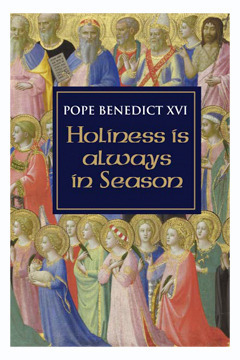On the personal testimony and effective preaching of St. Ambrose, Bishop and Doctor
From Pope Benedict XVI's October 24, 2007, general audience, dedicated to Saint Ambrose, whose feast is celebrated today:
Until that moment, Ambrose had been the most senior magistrate of the Empire in northern Italy. Culturally well-educated  but at the same time ignorant of the Scriptures, the new Bishop briskly began to study them. From the works of Origen, the indisputable master of the "Alexandrian School", he learned to know and to comment on the Bible.
but at the same time ignorant of the Scriptures, the new Bishop briskly began to study them. From the works of Origen, the indisputable master of the "Alexandrian School", he learned to know and to comment on the Bible.
Thus, Ambrose transferred to the Latin environment the meditation on the Scriptures which Origen had begun, introducing in the West the practice of lectio divina. The method of lectio served to guide all of Ambrose's preaching and writings, which stemmed precisely from prayerful listening to the Word of God. The famous introduction of an Ambrosian catechesis shows clearly how the holy Bishop applied the Old Testament to Christian life: "Every day, when we were reading about the lives of the Patriarchs and the maxims of the Proverbs, we addressed morality", the Bishop of Milan said to his catechumens and neophytes, "so that formed and instructed by them you may become accustomed to taking the path of the Fathers and to following the route of obedience to the divine precepts" (On the Mysteries 1, 1). In other words, the neophytes and catechumens, in accordance with the Bishop's decision, after having learned the art of a well-ordered life, could henceforth consider themselves prepared for Christ's great mysteries. Thus, Ambrose's preaching - which constitutes the structural nucleus of his immense literary opus - starts with the reading of the Sacred Books ("the Patriarchs" or the historical Books and "Proverbs", or in other words, the Wisdom Books) in order to live in conformity with divine Revelation.
It is obvious that the preacher's personal testimony and the level of exemplarity of the Christian community condition the effectiveness of the preaching. In this perspective, a passage from St Augustine's Confessions is relevant. He had come to Milan as a teacher of rhetoric; he was a sceptic and not Christian. He was seeking the Christian truth but was not capable of truly finding it.
What moved the heart of the young African rhetorician, sceptic and downhearted, and what impelled him to definitive conversion was not above all Ambrose's splendid homilies (although he deeply appreciated them). It was rather the testimony of the Bishop and his Milanese Church that prayed and sang as one intact body. It was a Church that could resist the tyrannical ploys of the Emperor and his mother, who in early 386 again demanded a church building for the Arians' celebrations. In the building that was to be requisitioned, Augustine relates, "the devout people watched, ready to

die with their Bishop". This testimony of the Confessions is precious because it points out that something was moving in Augustine, who continues: "We too, although spiritually tepid, shared in the excitement of the whole people" (Confessions 9, 7).
And from St. Augustine's Confessions, this praise for the great bishop:
And to Milan I came, to Ambrose the bishop, famed through the whole world as one of the best of men, thy devoted servant. His eloquent discourse in those times abundantly provided thy people with the flour of thy wheat, the gladness of thy oil, and the sober intoxication of thy wine. To him I was led by thee without my knowledge, that by him I might be led to thee in full knowledge. That man of God received me as a father would, and welcomed my coming as a good bishop should. And I began to love him, of course, not at the first as a teacher of the truth, for I had entirely despaired of finding that in thy Church--but as a friendly man. And I studiously listened to him--though not with the right motive--as he preached to the people. I was trying to discover whether his eloquence came up to his reputation, and whether it flowed fuller or thinner than others said it did. And thus I hung on his words intently, but, as to his subject matter, I was only a careless and contemptuous listener. I was delighted with the charm of his speech, which was more erudite, though less cheerful and soothing, than Faustus' style. As for subject matter, however, there could be no comparison, for the latter was wandering around in Manichean deceptions, while the former was teaching salvation most soundly. But "salvation is far from the wicked," such as I was then when I stood before him. Yet I was drawing nearer, gradually and unconsciously. (Bk. 5, ch. 13)
Read more.
On Ignatius Insight:
• All books by or about Joseph Ratzinger/Pope Benedict XVI
• Excerpts from books by Joseph Ratzinger/Pope Benedict XVI
Carl E. Olson's Blog
- Carl E. Olson's profile
- 20 followers



